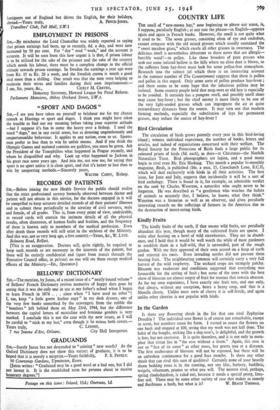COUNTRY LIFE
THE smell of "new-mown hay," now beginning to please our sense, is, I suppose, peculiarly English ; at any rate the phrase—in English—appears again and again in French books. However, the smell is not quite what it used to be. The sown grasses, consisting often of rye and cocksfoot, cannot compare with the old mixed grasses which usually contained the " sweet meadow grass," which excels all other grasses in sweetness. The delicious smell is nevertheless abhorrent to those noses that are allergic— horrible word!—to pollen. Like those breeders of pure grasses who seek out some isolated hollow in the hills where no alien dust is blown, so the sufferers from hay-fever must look for some pollen-free atmosphere. Research into the subject (of which there is an interesting account in the summer number of The Countryman) suggests that there is pollen and pollen in this regard. Only some sorts of pollen produce hay-fever ; and there seems to be some hope that the infectious pollens may be isolated. Some country people hold that mug-wort or old hen is especially to be avoided. It certainly has a pungent smell, and possibly smell alone
may cause hay-fever ; but the chief enemy is more likely to be one of the very light-seeded grasses which can impregnate the air at quite extraordinary distances from the source. It may turn out that modern farming methods, especially the substitution of leys for permanent grasses, may reduce the source of hay-fever I






























 Previous page
Previous page